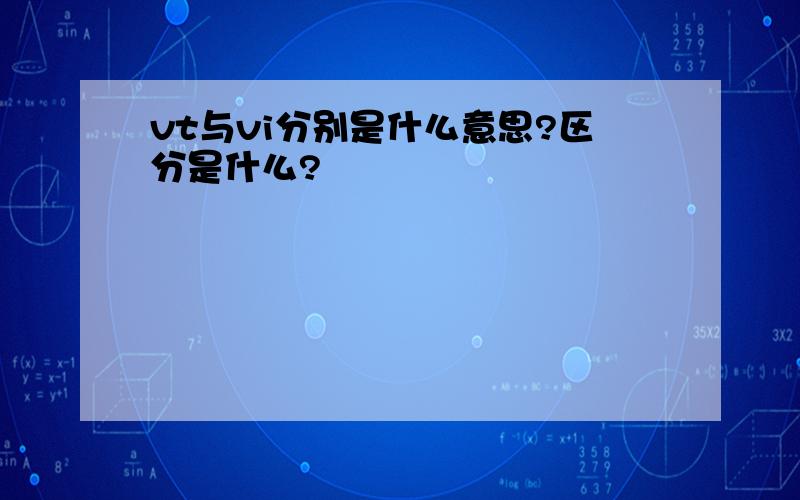vtдёҺviеҲҶеҲ«жҳҜд»Җд№Ҳж„ҸжҖқ?еҢәеҲҶжҳҜд»Җд№Ҳ?
жқҘжәҗпјҡеӯҰз”ҹдҪңдёҡеё®еҠ©зҪ‘ зј–иҫ‘пјҡдҪңдёҡеё® ж—¶й—ҙпјҡ2024/10/03 18:14:43

vtдёҺviеҲҶеҲ«жҳҜд»Җд№Ҳж„ҸжҖқ?еҢәеҲҶжҳҜд»Җд№Ҳ?
vtдёҺviеҲҶеҲ«жҳҜд»Җд№Ҳж„ҸжҖқ?еҢәеҲҶжҳҜд»Җд№Ҳ?
vtдёҺviеҲҶеҲ«жҳҜд»Җд№Ҳж„ҸжҖқ?еҢәеҲҶжҳҜд»Җд№Ҳ?
еүҚиҖ…жҳҜеҸҠзү©еҠЁиҜҚзҡ„зј©еҶҷ,еҗҺиҖ…жҳҜдёҚеҸҠзү©еҠЁиҜҚзҡ„зј©еҶҷпјӣеҸҠзү©еҠЁиҜҚеҗҺйқўзӣҙжҺҘеҸҜд»Ҙи·ҹеҠЁиҜҚ,дёҚеҸҠзү©еҠЁиҜҚеҗҺйқўиҰҒз”ЁдёҚе®ҡејҸзҡ„еҪўејҸto doжҲ–иҖ…ж №жң¬дёҚиғҪи·ҹеҠЁиҜҚ
vt= verb transitive, еҚі еҸҠзү©еҠЁиҜҚ, еҗҺйқўеҝ…йЎ»и·ҹжңүеҗҚиҜҚobjectзҡ„еҠЁиҜҚгҖӮ
e.g.Harry sees Adam. (Adam is the direct object of "sees")
You lifted the bag. (bag is the direct object of "lifted")
I punished you. (you...
е…ЁйғЁеұ•ејҖ
vt= verb transitive, еҚі еҸҠзү©еҠЁиҜҚ, еҗҺйқўеҝ…йЎ»и·ҹжңүеҗҚиҜҚobjectзҡ„еҠЁиҜҚгҖӮ
e.g.Harry sees Adam. (Adam is the direct object of "sees")
You lifted the bag. (bag is the direct object of "lifted")
I punished you. (you is the direct object of "punished")
I give you the book.
vi=verb intrasitive, еҚіеҗҺйқўж— йЎ»еҠ дёҠеҗҚиҜҚobjectзҡ„еҠЁиҜҚгҖӮ
e.g.Harry will sleep until sunrise. (sleep has no object)
He died on Friday. (die has no object)
You smell. (smell has no object)
收иө·
еүҚиҖ…жҳҜеҸҠзү©еҠЁиҜҚзҡ„зј©еҶҷпјҢеҗҺиҖ…жҳҜдёҚеҸҠзү©еҠЁиҜҚзҡ„зј©еҶҷпјӣ
VT.еҸҠзү©еҠЁиҜҚ
VI.дёҚеҸҠзү©еҠЁиҜҚдёҚеҸҠзү©еҠЁиҜҚеҗҺйқўеҸҜд»ҘзӣҙжҺҘи·ҹе®ҫиҜӯпјҲеҗҚиҜҚгҖҒеүҜиҜҚвҖҰпјүдёҚеҸҠзү©еҠЁиҜҚеҗҺиҰҒеҠ д»ӢиҜҚпјҲin,on.atвҖҰпјүжүҚеҸҜи·ҹе®ҫиҜӯгҖӮ